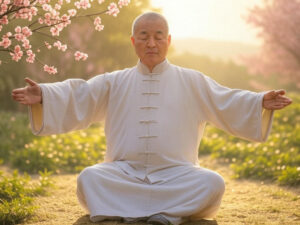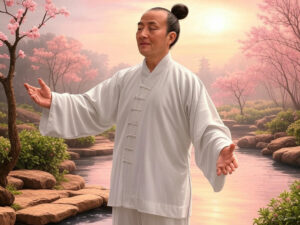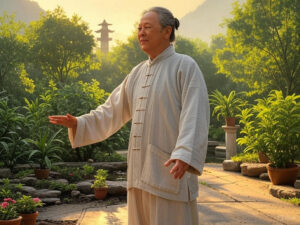—>health.bedscape.com (Main Page) —>Blogposts -Because Your Health is Important
—>Bedscape.com –Become a Warrior in Bed
“In the midst of chaos, Qigong became my sanctuary, transforming my body and mind in ways I never imagined. As a beginner, I started with simple movements and felt energy flow through me, bringing calm and balance. If you’re new to Qigong, this ancient practice can unlock a sense of well-being and vitality—and it’s easier to start than you think.”
What Is Qigong? A Beginner’s Overview
Qigong (pronounced “chee-gong”) is a centuries-old Chinese practice that blends gentle movements, deep breathing, and mindfulness to balance your body’s energy, called “Qi.” Think of it as a moving meditation that’s perfect for beginners looking to improve health and reduce stress. Rooted in Chinese philosophy and medicine, Qigong is all about harmony—connecting your mind, body, and spirit.
For beginners, Qigong is approachable because it doesn’t require fancy equipment or intense physical effort—just a willingness to try. In this guide, we’ll explore how to start Qigong, its benefits, and why it’s a game-changer for your well-being.
Why Try Qigong? Top Benefits for Beginners
Qigong offers physical, mental, and emotional perks that anyone can experience, even with basic practice. Here’s why it’s worth starting:
Physical Benefits
- Better Balance and Flexibility: Qigong’s slow, flowing moves improve coordination and mobility—great for beginners of all ages. Studies show it reduces fall risk in older adults and boosts joint health.
- Stronger Immunity: By balancing your energy, Qigong supports your immune system and overall vitality. Research highlights its ability to lower inflammation and improve heart health.
Mental and Emotional Benefits
- Stress Relief: Qigong’s deep breathing and mindfulness melt away anxiety and tension. Beginners often notice calmer minds after just a few sessions.
- Improved Focus: Regular practice sharpens mental clarity, making it ideal for busy people needing a reset.
Personal story: Sarah, a beginner, says, “I started Qigong to manage stress. Within weeks, I felt more grounded and slept better than ever.”
How to Start Qigong at Home: 3 Easy Steps for Beginners
Ready to try Qigong? You don’t need prior experience—just a quiet space and a few minutes. Here’s how to begin:
- Learn a Simple Move: Start with “Lifting the Sky”—stand tall, inhale as you raise your arms overhead, and exhale as you lower them. Repeat 5-10 times, focusing on your breath.
- Breathe Deeply: Qigong is about syncing breath with movement. Inhale through your nose for 4 seconds, then exhale slowly for 6. This calms your nervous system.
- Practice Daily: Begin with 5-10 minutes each morning or evening. Consistency is key, even for beginners.
Tip: Listen to your body—Qigong should feel gentle and relaxing, not forced.
Types of Qigong for Beginners
Not sure which style to try? Here are three beginner-friendly options:
- Medical Qigong: Focuses on health and healing—perfect if you want to boost energy or recover from fatigue.
- Martial Qigong: Combines strength and agility—great for those interested in physical power.
- Spiritual Qigong: Emphasizes mindfulness and peace—ideal for stress relief and self-discovery.
Start with Medical Qigong if you’re new—it’s simple and wellness-focused.
Self-Transformation Notebook Pack $19
Unlock your potential with this essential $19 bundle of five life-enhancing guides! Ready to thrive? Start here.
- END YOUR SNORING: Snoring isn’t just noisy—it can signal serious health risks like sleep apnea. Discover how to stop it naturally, without surgery, using quick, daily exercises that clear your airways and restore peaceful sleep.
- MASTER YOUR SLEEP: Poor sleep can sap your energy, fog your mind, and weaken your health over time. Master your sleep naturally—no pills needed—with proven habits and routines that unlock deep, refreshing rest tailored to you.
- THE HIDDEN WORDS WITHIN: Your body harbors unseen universes—trillions of microbes shaping your health, mood, and future. The Hidden Worlds Within reveals how these tiny allies in your gut and mouth can falter, fueling chronic illness and mental strain. With practical steps and fermented food recipes, harness their power—no lab required—to thrive from the inside out.
- SYMMETRY IN MOTION: ENHANCING FACIAL BALANCE THROUGH EXERCISES: Discover the secrets to a more balanced face without surgery—through simple exercises, the viral Mewing technique, and everyday habits that reshape your features over time. This book unveils how your jaw, cheeks, and eyes can find harmony, blending science, practical steps, and real stories to guide you toward subtle, confidence-boosting symmetry.
- ASTRAL AVAKENING: YOUR COMPLETE GIUDE TO OUT OF BODY EXPERIENCES, LUCID DREAMING AND CONSCIOUSNESS EXPLORATION: Unlock the secrets of your consciousness and soar into the astral realm with this transformative guide. From mastering out-of-body experiences to weaving their calm and creativity into your daily life, this book offers a 30-day journey to awaken your spirit and explore the unseen. Ready to lift off?
Qigong Principles Made Simple
Qigong revolves around three ideas beginners should know:
- Qi (Energy): Your life force—Qigong helps it flow smoothly for better health.
- Yin and Yang: Balance is everything. Qigong harmonizes stillness (Yin) and movement (Yang).
- Meridians: Energy pathways in your body. Qigong keeps them clear and active.
Best Resources to Learn Qigong for Beginners
Want to dive deeper? Check out:
- Books: “Qigong for Beginners” by Stanley D. Wilson—a clear, practical intro.
- Websites: Spring Forest Qigong (springforestqigong.com) offers free videos and tips.
- Classes: Search for local Qigong instructors or online workshops for guided practice.
Pro Tip: A qualified instructor can perfect your form—look for certified teachers near you.
Why Qigong Works: The Science
Science backs Qigong’s benefits for beginners:
- Heart Health: Studies show it lowers blood pressure and improves circulation.
- Stress Reduction: Research finds Qigong cuts cortisol (stress hormone) levels.
- Flexibility: Gentle stretches increase range of motion, even after a few weeks.
Start Your Qigong Journey Today
Qigong for beginners is more than exercise—it’s a path to balance, peace, and health. Whether you want to ease stress, boost energy, or simply try something new, Qigong fits into any lifestyle. Begin with a few minutes daily, and watch how this ancient practice transforms you.
Have questions about starting Qigong? Drop them below, and let’s get you flowing!








